Japanese startup that can 3D print human tissue takes home top prize at the 2015 Asian Entrepreneurship Award

Koji Kuchiishi of Cyfuse Biomedical winning the top prize
The Asian Entrepreneurship Awards bring together a who’s who of major universities and corporations seeking to support entrepreneurship. The companies participating in the pitch competition tend to be farther along in their development and tackle issues that resonate internationally.
Eight companies, with business models as diverse as 3D biological tissue printing to building a better app monetization tool, appeared before a highly decorated panel of judges: Michael Alfant, Group Chairman and CEO and Fusions Systems Group, Jesper Koll, most recently the Managing Director and Head of Japanese Equity Research at JP Morgan Securities Japan, Erik Vermeulen, VP and senior counsel corporate at Philips, and Yoko Ishikura, professor emeritus at Hitosubashi University.
Here’s a brief overview of all the startups:
Cyfuse Biomedical
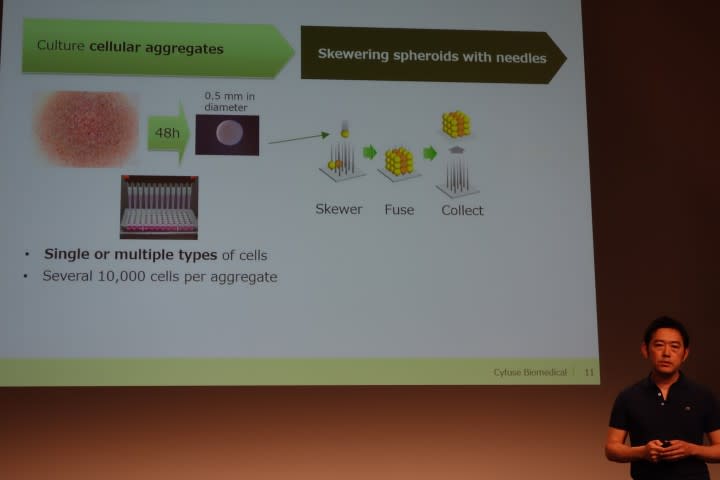
Founder Koji Kuchiishi
Cyfuse Biomedical is a startup pushing the boundaries of modern medicine. Led by Koji Kuchiishi, it is working to 3D print bioengineered organs to patients around the world. Founded in 2010, it has received US$17 million to attack a worldwide market expected to reach nearly US$100 billion by 2025.
Kuchiishi has already created a network of Japanese research universities to further develop the product, and is now seeking American and Asian counterparts. His patented process can produce tissue as quickly as one week after culturing the cells. More complex tissue, like a blood vessel, takes up to one month, but the result is a stronger piece of biological equipment. The blood vessels his company produces can withstand up to four times as much pressure as the average human’s.
Cyfuse Biomedical won the top prize and with it JPY 2 million (US$16,000). They also scored free rent at a the KOIL Park and Clip Nihonbashi co-working spaces for two years courtesy of Mitsui Fudosan.
Dynaoptics
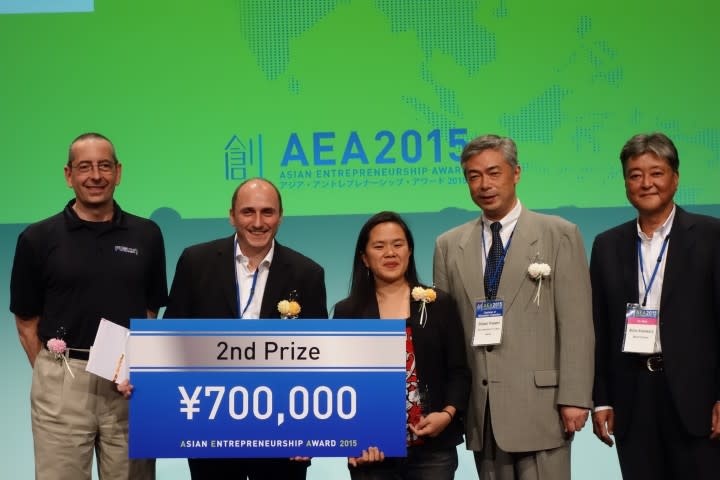
CEO Li Han Chan receiving her prize.
Founder and CEO Li Han Chan knows that people love taking pictures on their smartphones but hate not being able to zoom in to take high quality pictures. Current solutions are too bulky or too expensive, but Dynaoptics has figured out a way to give high quality 3x zoom to a smartphone.
In August 2014, it completed its proof of concept. Its lenses are made of regular plastics and manufactured using typical high volume production practices. Chan has been building a defensible business too – her company holds patents in optical design, manufacturing, and other aspects of the lens for over six countries.
The Singapore veteran has so far raised US$1.5 million on a pre-money valuation of US$8 million in its series A. With the new cash it is looking to strengthen its revenue streams of licensing, lens fabrications, and lens module assembly.
Dynaoptics took second place and JPY 700,000 (US$5,700).
Soft Space
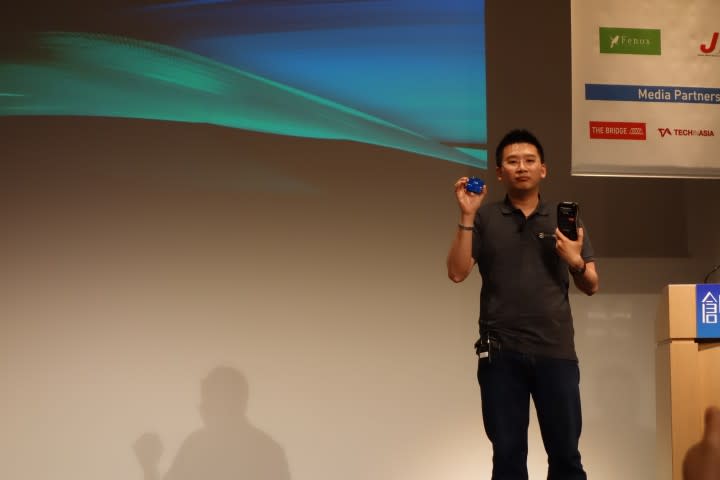
Founder and CEO Chang Chew Soon. The blue object is his company’s reader.
The Malaysia-based, Square-esque mobile payments solution has appeared in Tech in Asia and continues to raise its profile.
Founder and CEO Chang Chew Soon impressed the crowd with his explanation of the company’s rapid growth – live in 10 countries and partnered with 19 banks. The banking angle he explained is what makes his company more sustainable than competitors like Square, he explained. Instead of cutting banks out of the transaction fees, he partners with them. 90 percent of the startup’s profit comes from profit sharing with banks. Another 10 percent is rooted in direct licensing.
The company continues to ship its scanners apace. Able to interact with debit and credit cards, as well as next generation technology like Apple Pay, the hardware readers have gone from 2,000 units shipped in 2012 to an expected 135,000 this year.
All told, Soon says this adds up to a simple value proposition for potential Japanese clients: provide Japanese financial institutions access to 615 million people over 10 countries.
Soft Space took third place and JPY 500,000 (US$4,000).
Innova
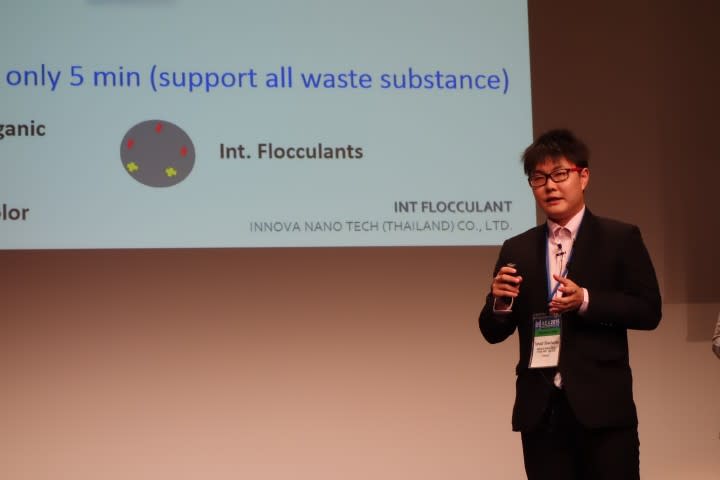
CEO Tanaut Sirachaitas
Tanaut Sirachaitas, CEO of Innova had an uneven showing. The Thai company’s concept is that it can help companies filter dirty water more cheaply and effectively than current methods. Globally, that means they can tap into the US$425 billion water water industry.
They are looking to sell their chemical solution and scale in Thailand first, before reaching out to India and Japan. Government and regulatory support has been slow, which is why the startup is seeking business clients first.
Innova did not place, but it did receive the Japan New Business Conference President’s Prize of JPY 300,000 (US$2,500).
Orthoneer

Orthoneer CEO Phata Techatewon
Orthoneer, a Thai company, zeroes in on a very specific problem in the world – “trigger finger” surgeries. Trigger finger is what happens when a finger tendon swells to the point that a person’s finger ends up bent, unable to straighten without considerable effort and pain.
According to CEO Phata Techatewon, it impacts 147 million people worldwide and results in 24 million surgeries. The current surgical method takes a week to recover from and has a risk of creating new scarring along the tendon. If that happens, the trigger finger becomes irreversible.
With Sittichoke Anuntaseree, co-founder and orthopaedic surgeon, Techatewon has developed the A-knife, a new tool to simplify trigger finger surgeries. With their product the surgery can be done in less than a minute. Rather than cutting at the tendon vertically as in previous methods, the knife slides along the tendon horizontally until it reaches the inflamed sheath, which is then cut. This significantly reduces the likelihood that the tendon itself will be damaged in surgery.
Orthoneer intends to start its business in Thailand and Southeast Asia before expanding to India and beyond. Via direct sales and clinic partnerships it will gross more than US$5 million this year with about US$1 million in profit. Within five years the startup expects to hit US$48 million in revenue with US$9 million in profit.
VMFive
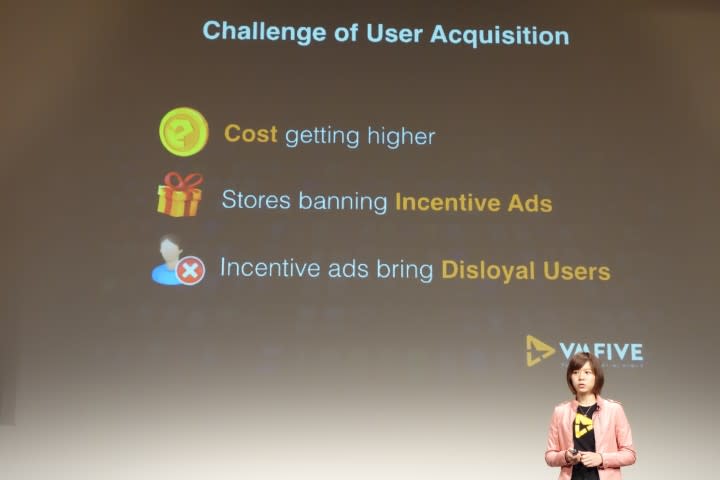
Director of marketing Jessie Wu
Fresh off first place wins at Slush Asia and TechCrunch Beijing 2014, VMFive made its typically well-received pitch.
As loyal readers might remember, VMFive’s main product is AdPlay. Working with app publishers, AdPlay makes it possible for consumers to give an app a whirl before committing to the purchase. The trial also creates a new opportunity for ads to be shown, winning the company some support from ad agencies and networks.
Though a Taiwan-based firm, it has already started collaborating with D2C, a joint venture with Japanese conglomerates Docomo and Dentsu. AdPlay also has a new partnership with Adways’ popular pre-order platform.
Director of marketing Jessie Wu is confident that Japan will be a welcoming market, citing a Google consumer survey that found 88 percent of app users would like to have a free trial. In the same study 84 percent said they want to try advanced level gameplay, too.
Neofect
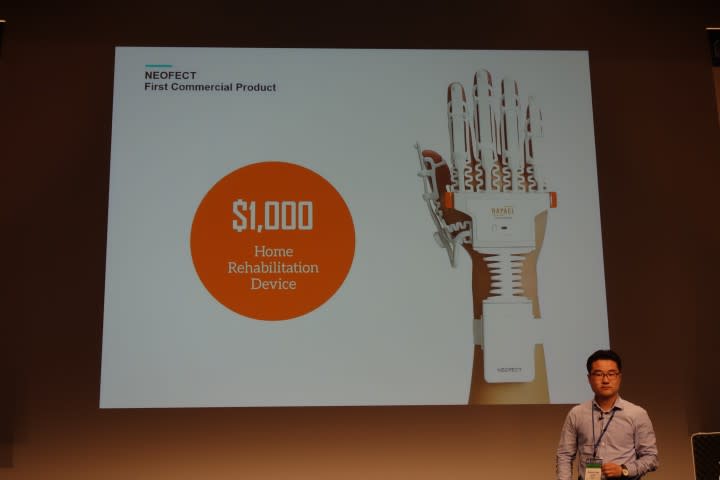
Founder HoYoung Ban
Samsung veteran turned startup founder HoYoung Ban is trying to change the way people recover from strokes. He says that the costs due to stroke in the United States each year hit US$62.7 billion and a typical patient faces nearly US$95,000 in inpatient and outpatient therapy.
To help the process, his team has created Rapael, a “smart glove” that resembles an exoskeleton for a person’s hand. The glove links up with computer software so the person can go through various strength and tactile exercises. For instance, a patient puts the exoskeleton glove on and their hand appears on a computer screen next to an orange. As they close their hand into a fist, the animated fist on the stage squeezes an orange into juice.
The data collected from these exercises is analyzed by a rehabilitation learning algorithm in order improve that individual’s recovery. At US$1,000, the device is considerably cheaper than competitors like Amadeo which can retail for US$100,000.
Rapael has already gotten a clean bill of health from both Korean and American FDAs. It has taken in US$5.5 million in outside funding so far and will be looking to raise another round in mid-2016. Ban projects US$1 billion in revenue by 2019 if he captures just seven percent of the combined US, German, and Korean markets.
Cascube

CEO Chishing Chan
Chishing Chan’s Cascube was another company that didn’t quite strike the right note with the judges. It seeks to reduce drug and biomedical research costs by making animal testing cheaper and more efficient. Namely, the former GSK employee determined that the devices used to monitor animals only record one animal at a time.
Using a more advanced camera array and implanted chips, Cascube closely tracks all animal movements more closely than typical video recorders.
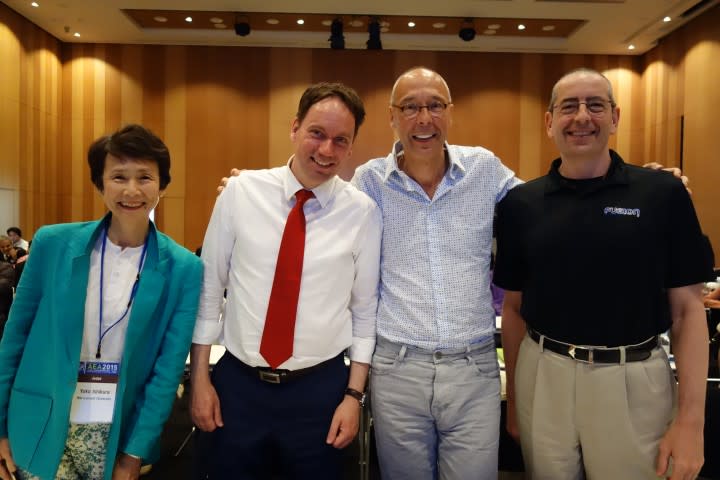
The judges, from l-r:
Yoko Ishikura, professor emeritus at Hitosubashi University, Erik Vermeulen, VP and senior counsel corporate at Philips, Jesper Koll, most recently the Managing Director and Head of Japanese Equity Research at JP Morgan Securities Japan, and Michael Alfant, Group Chairman and CEO and Fusions Systems Group
This post Japanese startup that can 3D print human tissue takes home top prize at the 2015 Asian Entrepreneurship Award appeared first on Tech in Asia.



